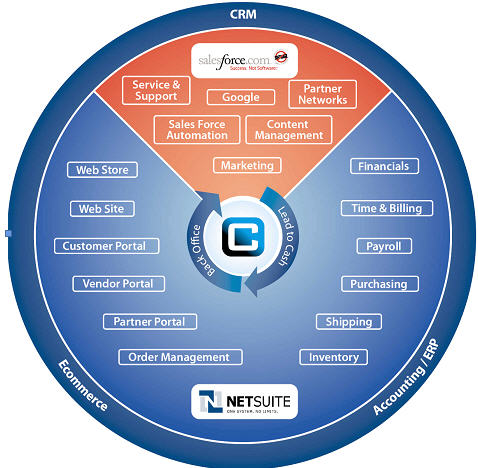NetSuite aims to connect to Salesforce.com's cloud

NetSuite on Thursday announced a set of connectors from third party developers that will hook up its enterprise planning software suite with Salesforce.com's CRM apps.
The idea: Allow Salesforce.com customers to integrate NetSuite applications into their arsenal of software as a service applications. The effort is dubbed SuiteCloud Connect for Salesforce.com.
NetSuite CEO Zach Nelson in an interview likened the SuiteCloud Connect effort as a way to link Salesforce.com's "CRM cloud" with NetSuite's "business application cloud." NetSuite and Salesforce.com have hundreds of joint customers and Nelson expects that number to increase going forward. Nelson said:
"We have functionality that's complimentary to Salesforce.com. What Saleforce.com has done for sales users is what we've we done for automating processes. This will be a win for joint customers both can use this to open up the market more."
The move is notable given the hubbub last week over IBM's Open Cloud Manifesto, which didn't garner sign-offs from major cloud players such as Amazon, Salesforce, Google and Microsoft. Meanwhile, other cloud companies including NetSuite and SuccessFactors didn't sign on either.
Why the holdouts? These companies argue that customers will demand that clouds connect anyway and ultimately pick the standards.
For NetSuite, the connection to Salesforce.com just makes sense. For starters, Salesforce is much larger in terms of annual revenue and has a larger installed base. If NetSuite can tap into an already SaaS-savvy audience it can add more customers.
Also see: Salesforce.com: Pondering the next 10 years
In a nutshell, SuiteCloud Connect is a group of integration applications that meld Salesforce.com's salesforce automation and customer relationship management software with NetSuite's ERP suite. NetSuite is hoping that the connection allows for best-of-breed SaaS deployments. Vendors such as Boomi, Celigo, Pervasive Software and Cast Iron Systems are the developers and integrators tying NetSuite and Salesforce together. These go-between vendors worked closely with NetSuite and Salesforce.com to align the data models. Nelson noted that NetSuite didn't build the connectors directly.
For the customer, NetSuite says its back office ERP and e-commerce apps such as order management, fulfillment and accounting will be seen within Salesforce.com's CRM software. Account information is also synchronized. This synchronization will be carried out with a series of SaaS integration experts.
Here's how NetSuite sees these connections happening:
A few thoughts on this development:
- For starters, NetSuite's move highlights the maturity of the SaaS market. Nelson noted that SaaS has come a long way in the last decade and has now reached the point where it can give serious competition to the incumbent on-premise software players.
- On the other hand, SaaS can become complicated and you still may find systems integrators and consultants mixed up in your deployments.
- Look for multiple connections like this as customers cobble together SaaS suites. On this point, Nelson made a few notable comments. He expects a little swing to a best-of-breed approach, but ultimately the suite approach will win out again.
- "The best of breed approach depends on the size of customers. If you have three SaaS providers that's three administration panels to manage," said Nelson. "The small customers prefer one suite. Larger companies are used to multi-vendor environments, but still have one system of record and that tends to be the ERP system. In very large companies the market is opening for SaaS, but ultimately it's still about suites." That suite approach is likely to remain dominant because it's easier to synchronize data.
- And then there's another layer to ponder. HP this week announced a SaaS suite that manages other SaaS provider s. A service to manage your services if you will. HP's suite aims to ensure security policies and service level agreements are kept.
- The risk here is that SaaS gets so complicated that it starts to mimic the problems involved with on-premise software implementations.
